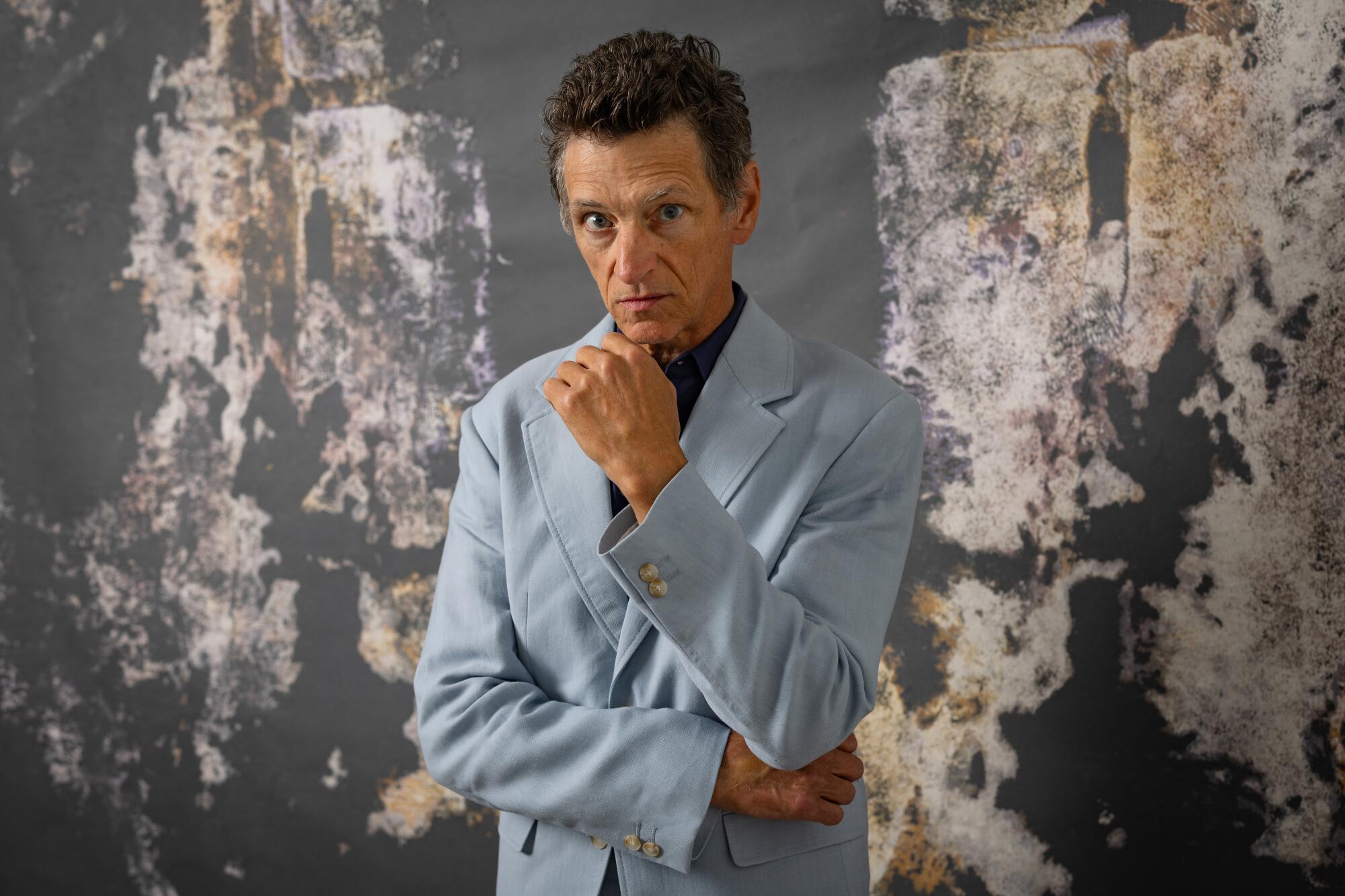
- Share via
After decades of letting heart and mind determine his career choices, John Hawkes has earned his first two Emmy nominations: for playing corrupt Alaskan cop Hank Prior in “True Detective: Night Country” and then, much to his surprise, for “No Use,” the song he composed and performs in the HBO limited series.
“The acting nomination was a real surprise and the song nomination was a real shock,” Hawkes notes. Despite an acting résumé with 140-plus entries — along with his supporting actor Oscar nomination for the Jennifer Lawrence film “Winter’s Bone” — the soft-spoken, intellectually impassioned Hawkes still thinks like an outsider artist.
“A lot of things I want to do don’t pay much, so that was sort of a quandary early on,” he says at HBO’s Culver City headquarters. “But I found my way into indie films a lot, I think, because there was such great writing and great roles, and I wanted to be part of that.”
The new season of HBO’s ‘True Detective’ is Issa López’s biggest project to date, and it’s deeply personal for the Mexican filmmaker, who says it’s rooted in the trauma she experienced following her mother’s death.
Raised in the farming community of Alexandria, Minn., Hawkes moved to Austin, Texas, to pursue music and acting “and to try to get warm,” he adds with a laugh. But he moved on to Los Angeles by 1990. His intelligent soulfulness soon garnered numerous TV appearances, including recurring roles in the likes of “Deadwood,” “Eastbound & Down” and the upcoming “Criminal,” which he’s midway through shooting in Oregon. He’s also earned praise for such film roles as the iron lung-using poet Mark O’Brien in “The Sessions”; a sweet/sad shoe salesman dad in Miranda July’s “Me and You and Everyone We Know”; and “Martha Marcy May Marlene’s” manipulative cult leader.
“Night Country’s” Hank is a whole other piece of work. He’s full of prejudices and resentments, crooked and inept at his job, and as lonely as any guy can be in the Arctic Circle town of Ennis. He barely controls his contempt for Police Chief Liz Danvers (Jodie Foster), who got the promotion he was promised for doing dirty work for local mining interests. Worse, Hank’s son Peter (British actor Finn Bennett) has followed his father into law enforcement, only to grow closer to better mentor Liz.
Despite Hank’s awfulness, he has a pathetic poignance. Hawkes worked closely with “Night Country” showrunner Issa López to lend the character such compelling dimensions.
“I always love to create my own backstory, and this was rare in that Issa helped a lot and we did it together,” the actor says. “I was concerned that, as first written, Hank wore his chauvinism on his sleeve, was a little one-note and not very nuanced. She took my ideas to make the character sing. I might say something like, ‘I don’t think Hank left his wife or she died; I think that she left him.’ You always want to raise the stakes, make things as bad as you possibly can for your character. I’d mention something like that, and she’d take it in other directions that were better, a lot of times, than what I suggested.”
Hawkes repeatedly pushed against one of her suggestions, though. He’s delighted those efforts failed.

“When Issa came up with the guitar scene, I initially blanched, thinking that if this guy was creative he probably wouldn’t be the person he is,” the actor says. “But as I thought about it more, when I’m reading a book or watching a film, I’m most compelled by a character acting out of character. David Milch used to tell us on ‘Deadwood’ that we’re all mysteries to ourselves, we’ve all done things in our lives, then said, ‘I can’t believe I did that.’ So it was a great idea in the end, and I just pictured Hank as a guy who kept his creativity a secret from the world.”
Hawkes has contributed original songs to several of his films: “Winter’s Bone,” “The Peanut Butter Falcon,” “Too Late,” “Unlovable.”
“It feels like a great gift to add to the project in another way and bring something of use,” he says of these production side gigs. “I just love music and songs, and to bring one of my own to something is an incredibly lucky and special thing.”
Hawkes hadn’t intended to sing in “Night Country.” But there was a live-music venue in Iceland, where the series was filmed, that proved fatally enticing.
“Originally, Issa asked me to write a short score piece,” he explains. “From the script, I realized it would begin with Hank just playing guitar quietly at home, then the guitar would be scoring the scenes of Kali [Reis, who plays the show’s other key detective] and Jodie’s characters searching for ice caves and meeting with disappointment, then going to a mine protest.
“But when I was in Reykjavík, I played a show on a Saturday night. Issa came, then said, ‘Well, Hank’s gotta sing!’ I didn’t think that was a good idea, but we good-naturedly went back and forth for several weeks. I resisted writing lyrics, but I’m so glad that she prevailed.
The pro boxer turned actor hasn’t officially hung up her gloves. What’s the appeal? ‘It’s ... the art of it. It’s like thinking on your toes,’ she says.
“It was fun, as a musician, to co-write with a person that doesn’t exist. I was deep into Hank’s world when I wrote those lyrics. ‘No Use’ reflects the Freud thing of love and work, and he’s not really getting anything out of either.”
The song emerges from Hank’s devastating realization that the “Russian bride” he’s paid to fly to him doesn’t exist. Odd, perhaps, that a seasoned cop could fall for such an old scam, but there are things we can’t believe we do.

“Even reasonably intelligent people can be taken in by fairly obvious schemes when their heart is involved,” Hawkes says. “Hank really is in love with at least the idea of her coming. Rather than make it a thing of he wants to get laid, it’s just a deep-seated need for connection that’s yanked away from him — just another in a series of disappointments, basically.”
Which brings us back to that poignant/pathetic dynamic Hawkes excels at conveying.
“People in pain?” the actor suggests such characters be called. “P-I-Ps? Pips, if you will. One thing that I’ve learned along the way is even if a character you’re playing has every right to wallow in self-pity, they must never. As an audience member, I don’t want to watch anyone navel gaze. Part of what’s beautiful about the creative world is the idea of dealing with difficulty. Without conflict, there’s no story. It would be great if the world was perfect, but art would be pretty boring, I would imagine.
“The idea is to always be fighting to solve your problem,” Hawkes concludes. “And when you play people, as I do, who are ill-equipped, who don’t have the tools to do that, that’s an interesting thing to watch.”
More to Read
From the Oscars to the Emmys.
Get the Envelope newsletter for exclusive awards season coverage, behind-the-scenes stories from the Envelope podcast and columnist Glenn Whipp’s must-read analysis.
You may occasionally receive promotional content from the Los Angeles Times.












